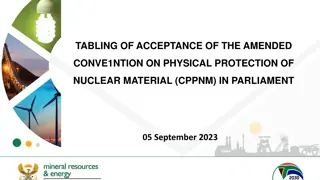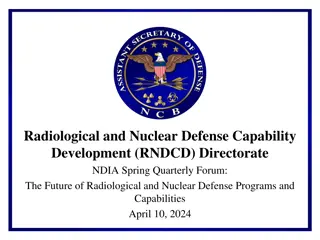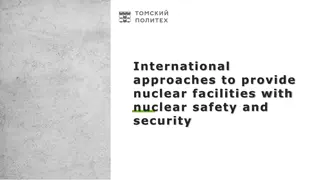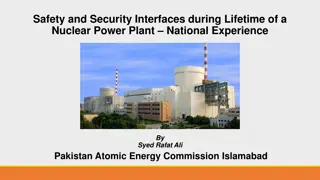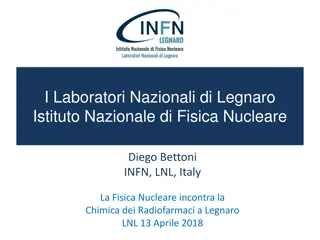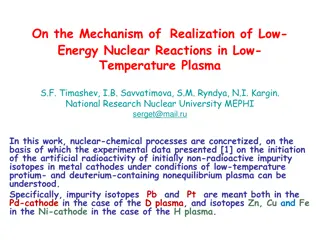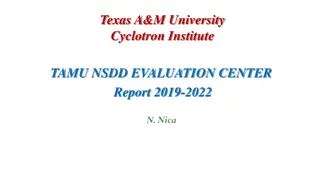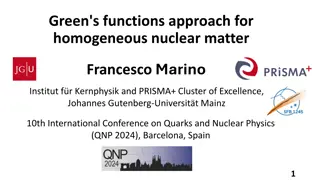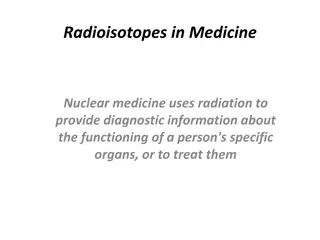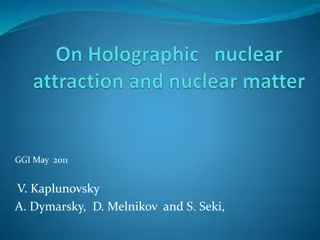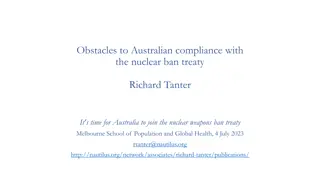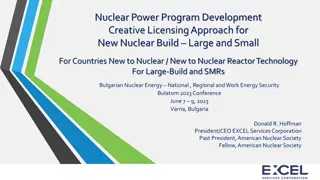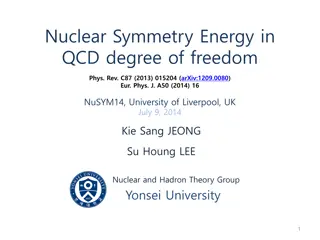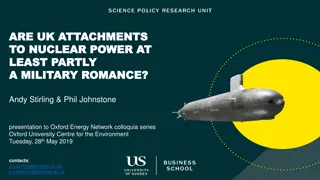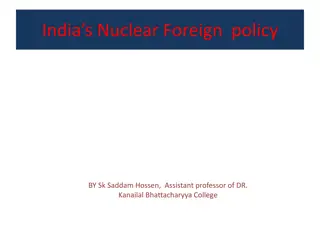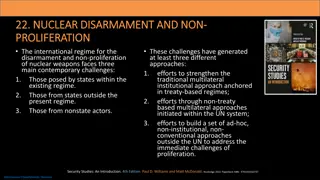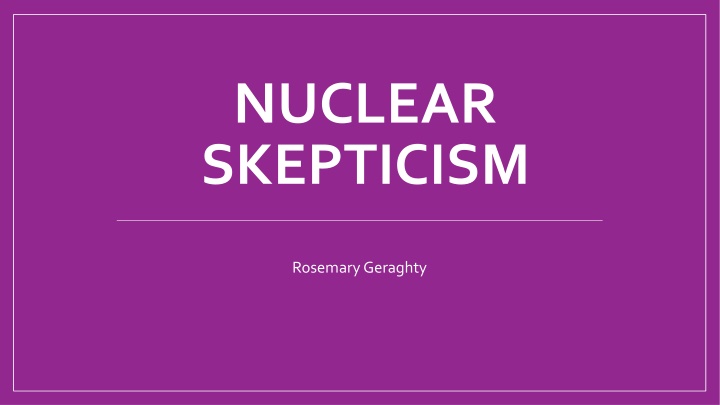
Challenges of Nuclear Deterrence and Proliferation
Explore the complexities of nuclear skepticism, organization theory, deterrence, and the impact of military organizations on stable nuclear deterrence. Learn how civilian control is crucial in countering organizational biases for effective deterrence. Uncover the major requirements for maintaining stability in nuclear deterrence, and the risks associated with preventive wars in the transition to nuclear capabilities.
Download Presentation

Please find below an Image/Link to download the presentation.
The content on the website is provided AS IS for your information and personal use only. It may not be sold, licensed, or shared on other websites without obtaining consent from the author. If you encounter any issues during the download, it is possible that the publisher has removed the file from their server.
You are allowed to download the files provided on this website for personal or commercial use, subject to the condition that they are used lawfully. All files are the property of their respective owners.
The content on the website is provided AS IS for your information and personal use only. It may not be sold, licensed, or shared on other websites without obtaining consent from the author.
E N D
Presentation Transcript
NUCLEAR SKEPTICISM Rosemary Geraghty
THE PERILS OF PROLIFERATION: ORGANIZATION THEORY, DETERRENCE THEORY, AND THE SPREAD OF NUCLEAR WEAPONS Scott D. Sagan
Rational Deterrence Theory Optimistic Organization Theory Pessimistic
CENTRAL ARGUMENTS
Professional military organizations, if left on their own, are unlikely to fulfill the operational requirements for rational nuclear deterrence. Professional military organizations display strong proclivities toward organizational behaviors that lead to deterrence failures. common biases, inflexible routines, and parochial interests
Such organizational proclivities can be effectively countered only by tight and sustained civilian control of the military. Many current and emerging proliferators either have military-run governments, or have weak civilian-led governments in which the professional military has a strong and direct influence on policy- making. In such states, the biases, routines, and parochial interests of powerful military organizations, not the "objective" interests of the state, can determine state behavior. Some states have been born nuclear Ukraine, Belarus, and Kazakhstan inherited nuclear weapons from the Soviet Union, without inheriting its stable civil-military relations, historical learning experience, or extensive command and control mechanisms.
MAJOR REQUIREMENTS FOR STABLE NUCLEAR DETERRENCE
1) There must not be a preventive war during the transition period when one state has nuclear weapons and the other state is building, but has not yet achieved, a nuclear capability
For optimists: if there is even a remote chance of nuclear retaliation, a rational decision-maker will not launch a preventive war. For pessimists: as a result of organizational biases in the military is likely to favor preventive war. Military officers are inclined to see war as likely in the near term and inevitable in the long run. Bound to military logic. Biases in favor of offensive doctrines and decisive operations. Plan incrementally. Case Studies US Pakistan Ukraine
2) Both states must develop not just the ability to inflict unacceptable damage to the other side, but also a sufficient degree of "second-strike" invulnerability so that its forces could retaliate if attacked first.
Organizational Problems: Making nuclear arsenals less vulnerable to attack is expensive and does not increase military hardware. Organizations are resistant to change. Survivability measures may simply be perceived as unnecessary. Organizational routines could impede invulnerability. Case Studies: US China Pakistan
3) The nuclear arsenals must not be prone to accidental or unauthorized use.
Highly Rational construct highly redundant systems with numerous back-up safety devices; use trial and error learning to fix organizational problems when they emerge; and develop a "culture of reliability" through strong socialization and discipline of the organization's members. Boundedly Rational Organizations contain political conflicts over goals and rewards. Conflicting objectives (Charles Perrow) Accidents are inevitable when: High interactive complexity (systems containing numerous interrelated, yet unplanned, interactions which are not readily comprehensible) Tight coupling (systems with highly time-dependent and invariant production sequences, with limited built-in slack). Case Studies
A WORLD WITH MORE NUCLEAR-ARMED STATES MAY BE OUR FATE, BUT IT SHOULD NOT BE OUR GOAL.
THE ESSENTIAL IRRELEVANCE OF NUCLEAR WEAPONS: STABILITY IN THE POSTWAR WORLD John Mueller
Nuclear weapons neither crucially define a fundamental stability nor threaten severely to disturb it.
Non-Nuclear Factors Avoiding World Wars Postwar Contentment Soviet Ideology Fear of Escalation US Economic Dominance
The Korean War Despite the vast American superiority in atomic weapons in 1950: The Soviet Union became involved in the Korean War. It must be assumed that [Stalin] would have done so at least as readily had nuclear weapons not existed. The US did not handedly succeed.
The Cold War Prenuclear Thinking NATO, Alliances The advent of nuclear weapons had not influenced the American determination to restore the European balance of power. It was, in fact, an objective which the United States would have had an even greater incentive to undertake if the fission bomb had not been developed."
NUCLEAR WEAPONS HAVE CHANGED LITTLE EXCEPT OUR WAY OF TALKING, GESTURING, AND SPENDING MONEY.
Crisis Stability the notion that it is desirable for both sides in a crisis to be so secure that each is able to wait out a surprise attack fully confident that it would be able to respond with a punishing counterattack General Stability concerned with balance derived from broader needs, desires, and concerns General Stability prevails when two powers, taking all potential benefits, costs, and risks into account, greatly prefer peace to war whether crisis stability exists or not. The Hollandization Phenomenon


